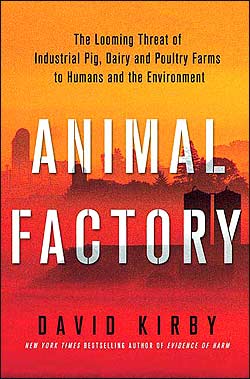
In Deep Shit
Factory farms from the Northwest to North Carolina
by Camilla mortensen
Animal Factory: The Looming Threat of Industrial Pig, Dairy and Poultry Farms to Humans and the Environment, non-fiction by David Kirby. St. Martin’s Press, 2010. $26.99
 |
Journalist David Kirby’s lengthy tome (exceeding 400 pages) seems to take its name and its criticism of tyranny based on hypocrisy from George Orwell’s Animal Farm. Each of its three stories focuses on the efforts of families battling not only big business, but bureaucracy, weak enforcement and crooked politics in order to preserve their health and their way of life, threatened by massive animal farms and the manure they produce.
Concentrated Animal Feeding Operation (CAFO) is the official federal designation for poultry and livestock operations, Kirby writes, “with more than one thousand ‘animal units,’” but they are more commonly known by the name “factory farm.”
The author of a New York Times bestseller on autism and vaccinations, Evidence of Harm, Kirby takes on the evils of factory farming in three areas of the country: the Pacific Northwest, the Midwest and the South. In each locale, the issue is different, from enormous dairy farms stinking up Washington’s Yakima Valley to lagoons of pig poo overflowing into rivers in North Carolina and causing massive fish kills, but the result is the same: environmental degradation, ill health and unhappy neighbors.
The biggest problem for those living near factory farms, aside from animal rights issues for pigs, cows and chickens crowded into small pens, is the manure. Thousands of “animal units” produce tons of poo. CAFOs get rid of the manure primarily by piling it up, storing it in “lagoons” and sometimes spraying the excess across their fields. This translates to air filled with poop particles and, thanks to leaky lagoons, contaminated waterways. As Kirby documents in cases across the country, rainy days can turn a full lagoon into an overflowing river of manure, and supposedly sealed pools can excrete waste into the watertable.
Rick Dove and other North Carolina river lovers find themselves literally up shit creek without a paddle when pig manure from CAFOs begins to kill off thousands of fish and sicken those who live, play and work near the Neuse River. Helen Reddout and her Yakima-area neighbors face dirty water and air redolent with cow feces. Karen Hudson and the townspeople of Elmwood, Ill., fight thousands of polluting pigs and, later, dairy cows. Each family struggles against the inexorable tide of waste and toxins.
Kirby avoids the classic conservationist (lefty) versus business dichotomy (Republican) in focusing on people like ex-Marine turned Riverkeeper, Dove, new to saving the rivers and the trees and the trials and tribulations polluters cause: “CAFO. The first time Rick heard a friend utter the term, he thought it must be some new kind of espresso place.”
Or as a Washington farmer, fighting to keep more huge dairies from invading and destroying the air and water of his small rural community, puts it, “We’re your neighbors. We aren’t environmentalists.”
One of the biggest lefties in the book is Eugene-based attorney Charlie Tebbutt, then working for the Western Environmental Law Center (WELC), hired by farming families, like that of Helen Reddout, turned anti-CAFO activists in the Yakima Valley to aid them in their fight against encroaching factory farms. “‘Oh brother, get a load of this one,” Helen whispered to Mary Lynne. ‘I was expecting a lawyer in pinstripes. And what do we get? A hippie.’”
Kirby’s journalistic account isn’t trying to give an unbiased view of factory farming — his sympathies clearly fall on the side of the environment and small farmers — but his work is well-researched and thoroughly documented — so well documented in fact that some readers may at first be put off by the endnotes interjected throughout the book.
Animal Factory is a valuable addition to the growing number of works like Food Inc. and The Omnivore’s Dilemma exposing the ills of mass-produced meat and dairy Kirby uses the stories of the three families, as they move from their local fights to the national scene, to draw readers — both those familiar with the factory farming debate and those new to it — into the morass of government regulations and lawsuits that surround the CAFO issue.
Animal Factory author Kirby will speak at PIELC on the “Poop on Factory Farms” panel at 3:35 pm on Feb. 26 in EMU Fir along with Righteous Porkchop author Nicolette Hahn Niman. Tebbutt will moderate the poop panel and speaks on the “Holy Crap” panel at 2:15 pm Saturday, Feb. 27, in Law 175. A book signing will accompany Kirby’s Saturday 7 pm keynote address.